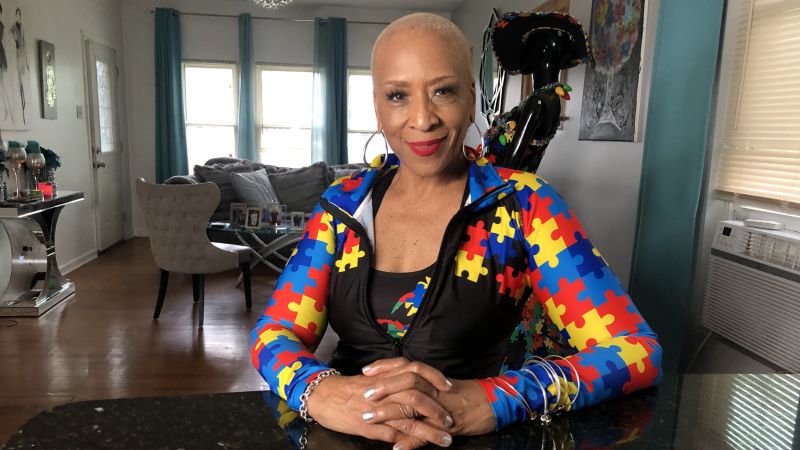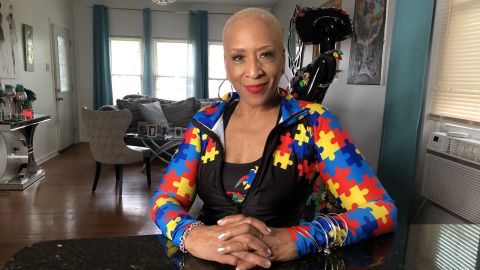
Maywood, Illinois
CNN
—
In the spring of 1989, Debra Vines found her 18-month-old son, Jason, staring ahead blankly in his crib, as if he was in another world. Alarmed, she and her husband rushed him to the hospital.
After visiting several doctors, they eventually got a diagnosis: autism.
Today, the Centers for Disease Control and Prevention estimates that 1 in 44 children in the US is on the spectrum. But in the 1980s, only roughly four in 10,000 children were identified as having autism.
“I had never heard of autism outside of Rain Man,” Vines said, referring to the hit movie that had been released a few months earlier. “I got books, I went to the library, but I still felt lost – like I just wasn’t a great mom.”
As Jason got older, Vines had to contend with his frequent tantrums and occasionally violent behavior that children with autism may exhibit. Her family moved from Chicago to Maywood, a small, predominantly Black suburb, hoping there would be more services, but the assistance lagged far behind that of more wealthy communities. Vines says she was desperate for support.
“My whole life revolved around finding services for Jason. To be able to get any type of assistance I had to take a train, plane, bus, and a magic carpet to get there,” she said. “Multiple cocktails of medication, changing doctors, changing hospitals. And most of it I did alone because my husband worked nights. I felt totally helpless.”
The support groups that she did find were in affluent communities. Not only was it hard for her to get to without a car, but when she did arrive, she felt out of place.
“I was the only Black woman there, I was the only person that had low income,” she said. “The women – they were great. They were giving me resources. But they would say, ‘They only cost $500.’ And I’m trying to figure how I’m going to get groceries for next week. Imagine how I felt then – even more helpless.”
Ultimately, Vines sought solace in drugs.
“I was a functioning addict. I still kept red lipstick on. I was still his mom. You still saw Jason with me everywhere I went,” she said. “I kept things moving.”
She eventually ended up in prison, and after she finally got clean in June of 2005, she had found her mission.
“I made a vow that I wouldn’t want any parent to have to experience what I’ve been through,” she said.
In 2007, Vines and her late husband, James Harlan, created The Answer Inc., a nonprofit that supports families in underserved communities who’ve been impacted by autism. To date, Vines says the group has provided programming and guidance to more than 4,000 families in the Chicago area.
“Families are always asking questions, and we want to provide the answers,” she said. “I would say 95% of everything that we provide is a blueprint of what I was missing as a parent.”
Many of those who Vines supports are from Black and Brown communities – a demographic known to face hurdles in the diagnosis and treatment of autism. The CDC reports that Black and Hispanic children are less likely to be identified with the condition, and researchers at Boston University found that Black children are five times less likely to receive early intervention services than white children – due in part to racial bias and cultural stigma.
Vines is working to change that. Once children have been diagnosed, she helps connect families with the information and services they need, especially within the school system. Her organization also provides parent support groups, a 24-hour helpline, and a host of activities for individuals impacted by autism.

At the heart of the group’s programming are the free and low-cost classes held every Saturday at a local community center. These include tutoring, exercise, dance, nutrition and even a social skills class for young women that covers topics like relationships and sex education. Open to individuals of all ages with autism – as well as those with intellectual or developmental disabilities – these programs give students a valuable chance to socialize while giving their caregivers a much-needed break.
It’s been a long road, but Vines is confident she’s found the right path.
“Jason has taken me places that I never thought that I would go,” she said. “But (he) made me grow up to a woman that I never thought that I would be.”
CNN’s Kathleen Toner spoke with Vines about her work. Below is an edited version of their conversation.
CNN: Your organization has evolved to provide many services. How did it start?
Debra Vines: My work started to primarily support the moms because women want to be able to talk about what they’re going through. We learn from each other, and having a child with a special need, we carry so much – having to deal with your child screaming or head-butting you, not being able to go anywhere because you can’t find anyone to watch your kid, not being able to work.
A lot of special needs parents don’t have many friends. It’s not that our friends don’t love us, but they stop calling. So, I wanted to tell my story so women wouldn’t fall down that rabbit hole that I’d been in. I wanted to help them be the best they can be for their child.
CNN: You now support men as well.
Vines: Oh yes, men come to our support groups as well, and we also have a group called “Just for Men.” It’s so funny because my late husband, he would go to some of the support groups with me and then he started saying, “Where are the men?” And so I said, “Well, why don’t you create a space for them?” So he did! They would do nature walks, go to sports bars, go to games. And they ended up talking about their kid, and having solutions for each other, so it was amazing.
CNN: You also do a lot to educate the community at large about autism.
Vines: People are afraid of what they don’t understand. We have a lot of children that don’t have great social skills, and with the numbers growing with autism, we want to make sure that the community is totally educated – the churches, department stores, legislators. And there’s so much that has gone on with police officers with our special needs community. For instance, Jason had a medication meltdown where he was very, very violent. And I had to call the ambulance. The fire department called the police. And they came in with guns drawn. I’m telling them all the time, “There’s no weapons. My son has autism.” They weren’t hearing anything. So, we want to make sure that the first responders are trained, and I’m proud to say that just about every village within the Proviso Township (in Illinois) has been trained on the signs and symptoms of autism. Advocacy is a gift. I’m good at it, and it makes me feel so good. That’s my high now.
Want to get involved? Check out The Answer Inc.’s website and see how to help.
To donate to The Answer Inc. via GoFundMe, click here
